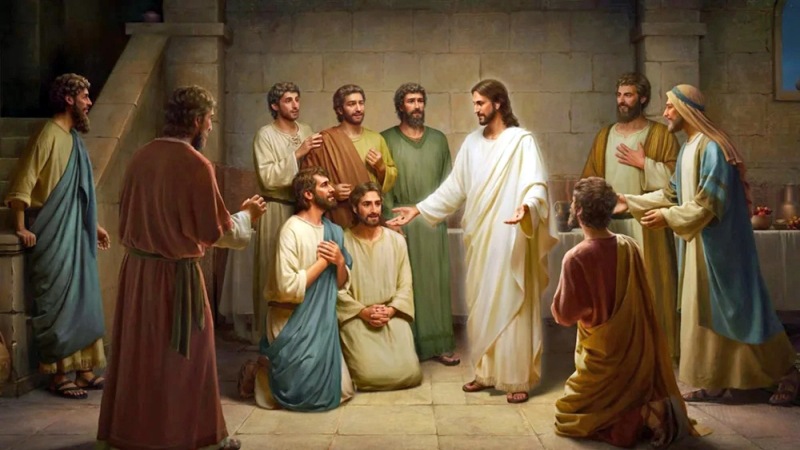
A. The religion of Christ forms one organic whole.
The religion founded by Christ comprises those truths, precepts, and means of salvation by which those who profess it are united with God and, in virtue of this union, with one another. It is therefore, in the strictest sense of the words, one religion, not a plurality of religions.
I. The unity of its Founder alone implies the unity of the Christian religion. This conclusion will appear the more evident if we consider Christ in His relation to Moses. Christ was promised as a Prophet and Law-giver like Moses. But Moses was the promulgator of one law, the founder of one religion, which prescribed for all the same faith, the same duties, and the same institutions. Therefore Christ, as a prophet and law-giver like Moses, must also have united all His adherents with God and with one another by one religion.
II. Christ expressly declares His intention to unite His followers by one common religion. And other sheep I have that are not of this fold. Them also I must bring,
and they shall hear My voice, and there shall be one fold and one shepherd
(John 10: 16). Christ gathered Jews and gentiles into one fold, of which He Himself was the shepherd.
But if all form one fold under one shepherd, then all have one and the same pasture – that is, one and the same religion. But they can remain united as one flock only so long as they hold and
profess the same religion; for, as experience teaches, nothing so divides men as difference of religion.
III. The unity of Christ's religion is manifest from the commission given by Him to the Apostles: Go, therefore, and make disciples of all nations, baptizing them...
teaching them to observe all that I have commanded you
(Matt. 28: 19-20). Go into the whole world and preach the Gospel to every creature. He who believes and is baptized shall be saved,
but he who does not believe shall be condemned
(Mark 16: 15-16). One and the same doctrine, namely, the whole of the Gospel of Jesus Christ, is to be preached;
the same means of salvation are to be dispensed to all the faithful; the same divine precepts are to be imposed upon all. Therefore by command of Christ only one religion was to be preached to the human race.

Nothing, therefore, can be farther from the intention of Christ than the distinction between "essential" and "non-essential" articles of belief as advocated by Protestants. Christ wishes His whole Gospel to be preached and believed. The distinction, however, between fundamental and secondary truths, which are both alike to be believed, is admissible. Fundamental truths, in this sense, are those upon which the structure of the Christian doctrine rests as on a foundation. Such, for instance, is the dogma of the Divinity of Christ, which forms the basis of the Christian religion.
Though the truths of Christianity are to be received without distinction, yet the obligation of knowing them is not the same in regard to each single article. Every Christian, for instance, is bound to know those truths which form the substance of the Apostles' Creed. The same, however, does not hold true of all the other truths of revelation. We may, therefore, aptly distinguish between truths which all are bound to believe explicitly, and, consequently, to know, and such as all are bound to believe only implicitly. We believe implicitly inasmuch as we accept the entire Christian doctrine in general, or all that the Church, the guardian of revelation, teaches, whether we have a distinct knowledge of it or not.
B. The Christian religion is destined for all nations and for all individuals.
I. Unlike the Mosaic Law, which, according to its specific contents, was binding only upon the people of Israel, the Christian religion was to bind, not only one people, but all nations and all individuals.
1. This universal character of the Christian religion is manifest from the words of Our Lord to His Apostles above cited. If the Gospel is to be preached to all nations
and to all [rational] creatures,
it is destined for all, and all are obliged to accept it, apart from the menace of eternal punishment against those who believe not.
The Gospel answered this universal purpose, inasmuch as it prescribed a divine worship which was not to be confined to one place, but was to be offered everywhere to the omnipresent God (John 4: 21); inasmuch as it introduced laws and customs which were not calculated for one place only, but were intended to sanctify humanity in every place; inasmuch as it preached truths which enlighten and elevate every understanding; inasmuch as it held out to its followers goods which fully satisfy the yearnings of every heart.
2. The manner in which the Apostles executed their commission shows their conviction that Christianity was to be the religion of all nations and of all men. For, in their preaching they addressed themselves not only to the Jews, though they were sent, in the first instance, to them; but going forth, they preached everywhere (Mark 16: 20). Therefore in a few years the Gospel is preached, and bears its fruit in the whole world (Col. 1: 6). They knew that Christ, the Savior of all, although He Himself, as preacher of the Gospel of salvation, was sent only to the sheep that were lost from the house of Israel (Matt. 15: 24), yet had other sheep that were not of this fold, and which He was to lead into one fold by means of His disciples (John 10: 16).
3. The design of Providence, as far as it manifests itself in revelation, points to one religion which is destined to embrace all nations. To all men was promised the Redeemer Who was to restore the bond between man and God that had been severed by the disobedience of our first parents. It is true, an almost universal apostasy from the supernatural religion ensued; but meanwhile God preserved revelation among the patriarchs, and, at the same time, pointed to the coming of the Messias as a source of blessings to all the nations of the earth. But only in the case that all unite themselves to the Messias, and profess one religion, can He, in the true sense, become the Author of their happiness. Though at a later period the Mosaic Law introduced a wider separation of mankind, yet the same law points definitely to One by Whom the barrier is again to be removed – a Prophet and Law-giver, Who is none other then the Redeemer promised to our first parents, and subsequently to the patriarchs. Nay, the separation of the people of Israel, which dates from the time of Abraham, was brought about by Divine Providence to facilitate the propagation of the one true religion among all the nations.
As the Messias was frequently represented by the prophets to the Israelites as the Founder of the universal religion, so also, by the providence of God, at the time of Christ's coming,
as we learn from Tacitus and other writers, the conviction prevailed in the heathen world that a new order of things, originating in Judea, should be propagated over the whole world.
The Roman poet Virgil, with manifest reference to sacred books, sang the expected birth of a child who was to free the nations from misery and inaugurate a new golden age.
The poet uses images and expressions which remind us of those by which Isaias expresses his longing for, and points to the coming of, the Messias (Is. 9: 6-7; 11: 6-9; 49: 13).
In Greece, Plato expresses the general longing for a divine teacher who was to teach us how to behave towards God and man.
Even India and China bear witness to the yearning of mankind for a Redeemer.
Whether we regard these manifestations as traces of the revelation given to man, or as indications of a Divine Providence influencing the inner life of nations,
or as the expression of a general feeling of spiritual destitution, or as all these taken together – in any case, we may conclude from them that the idea of a universal religion,
as realized in Christianity, was altogether in keeping with Divine Providence, and in accord with the yearnings of the better portion of mankind.
II. If Christianity is destined to be the one religion of all nations and all individuals, it follows of necessity that every other so-called religion is false, and contrary to God's design. This is true not only of those religions which pretend to rest on a divine revelation (Islam), but also of natural religion (deism), which professes to worship God only as the Author of nature. Also Judaism is now a false religion, since it was destined to exist only until the coming of the Redeemer, and refused to recognize Him in the person of Christ.
C. The Christian religion is to endure to the end of time.
The Christian religion is destined to endure to the end of the world, not merely as a germ to be developed by divine influence, like the primitive religion; but it is to continue to exist as it was promulgated in the beginning. With Christ and the Apostles the divine religion was brought to a close; Christianity is, accordingly, not a phase of religious development; it is rather the completion, or the sum of the religious truths and institutions destined by God for mankind.
I. The primitive, as well as the patriarchal, and the Mosaic revelation, points to Christ as to Him Who was once to restore the order of things intended by God in the beginning. Now if, through Christ and through Christianity, that bond wherewith God wished to unite mankind to Himself was restored, we must conclude that the intentions of God in regard to man have been fulfilled, and, consequently, that no new revelation, nor further new bond of union, was intended between God and man.
II. Christ expressly declares that those truths which He taught, and which, after the descent of the Holy Ghost, His Apostles fully understood, in short –
that the revelation which He gave was to endure, and was not to be superseded by any other. For He sends forth His Apostles with the words: All power in Heaven and on earth has been given to Me.
Go, therefore, and make disciples of all nations… teaching them to observe all that I have commanded you; and behold, I am with you all days, even unto the consummation of the world
(Matt. 28: 18-20).
If unto the end of the world the entirety of the Christian truths is to be taught, it cannot be supplanted by other doctrines; nor is any other religion to take the place of that given by Christ.
If that power which Christ gave His Apostles is to remain unto the end of time, so also the religion for the preaching of which that power was given. And if Christ promised to be with His Apostles,
as the preachers of His Gospel, to the end of the world, that Gospel itself, in its identity, will continue to be preached to the end of time, since it is for the preaching of His doctrine that He promised
them His assistance.
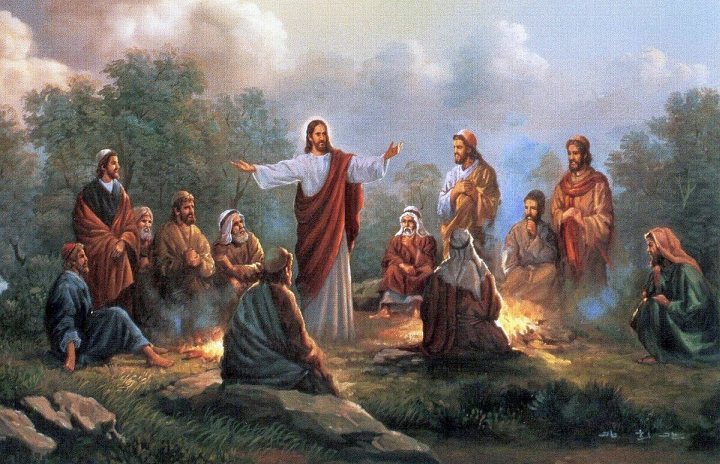
III. Different from Moses, who pointed to a new Law-giver, the Apostles not only do not promise the founder of a new religion, but clearly emphasize the fact that Christ inaugurated the last epoch of history, which was to terminate with the general judgment (1 John 2: 18: 1 Thess. 4: 15). Whence it follows that those institutions which God designed for the salvation of man have reached their completion in Christianity.
Hence subsequent revelations, vouchsafed to the Saints, form no part of the general Christian revelation, and are, consequently, called private revelations as distinguished from the public or universal revelation which is directed to all mankind. Therefore all those who in later times pretended to add new revelations to that already given – for instance, Montanus and his followers – have been looked upon by the Church as fanatics.
Hence it is evident that Christianity is not the initial stage of a process of religious evolution by which man, either necessarily or by his own free action, is to develop to an ever higher state of intellectual life; nor is it an intermediate stage, in time to be superseded by a higher. Such a supposition would rob Christianity of its supernatural character.
D. The Christian religion is unchangeable.
The Christian religion is unchangeable in all its revealed doctrines – in all those precepts and institutions which are intended for all men. No Article of Faith (regarding questions of doctrine) can be added or subtracted; nor can any dogma receive a different meaning from that given it by Christ.
I. The Christian religion is unchangeable if the sum-total of its doctrine, as preached by the Apostles, is to remain ever the same. That it will remain the same we are assured, on the one hand, by the commission given by Christ to His Apostles and their successors; and, on the other hand, by the promise made to them (Matt. 28: 18, 20). Christ charges His Apostles and their successors to preach to the end of time that doctrine which He had precisely defined, and which, by the inspiration of the Holy Ghost, they afterwards rightly understood; and to them and to their successors, as preachers of His doctrine, He promises His never-failing assistance. His intention was, therefore, that the entirety of His doctrine, which He had entrusted to them, should endure to the end of time; and by His assistance His intention continues to be realized.
II. For the unchangeableness of doctrine it is required that no dogma be set aside, no new article added, and no point of doctrine interpreted contrary to its original meaning. Now, it is easy to show that these three conditions are verified in regard to the Christian doctrine.
1. No dogma can be set aside; for Christ would have His whole doctrine preached to the end of time; and for the fulfillment of His will He assured His assistance to His Apostles.
2. No new dogma can be added; for with Christ, to Whom the law and the expectation of the nations point as to the Finisher of our religion, divine revelation is completed.
3. No dogma can be interpreted contrary to its original sense. For, doubtless, that meaning which the Apostles, filled as they were with the Holy Ghost (Acts 2: 4),
and instructed in all truth (John 14: 26; 16: 13), attributed to the various dogmas is the true one, and is, consequently, to be maintained to the end of time.
If the meaning of the teachings of Christ could, owing to the progress of knowledge, change in the course of time, the commission of Christ to His Apostles and their successors to preach His doctrine,
and the promise of His assistance, would be illusory and meaningless, extending only to the bare wording, not to the substance of His doctrine. Hence the decision of the Vatican Council
(de fide iv, c. 3): If anyone affirm it to be possible that dogmas at any time defined by the Church may, in accordance with the progress of science,
admit of another meaning than that which the Church understood and understands; let him be anathema.
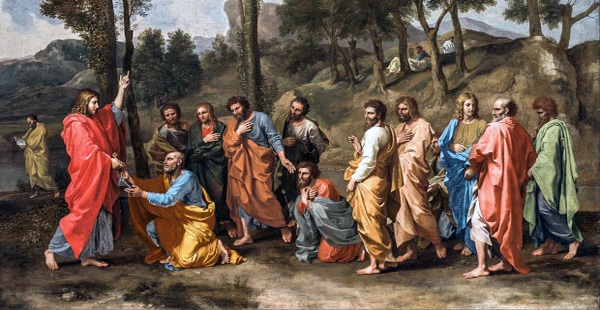
While the revealed doctrines are unchangeable in themselves and can admit of neither increase nor diminution, yet our knowledge of them may be perfected, as we may infer certain implied truths from those that are manifestly revealed; as, for instance, from the divinity of Christ we infer His omnipotence, and from His humanity we conclude His passibility. Hence the divine revelation is not changed by new definitions of the Church, but only such revealed truths as were not expressly or with sufficient certainty known to the faithful are brought to the certain knowledge of all as revealed, and thus made an object of our belief. Therefore our knowledge, not the deposit of Faith, is affected by such definitions. Hence they show a superficial knowledge of the Christian religion and of the Church who assert that dogmatic definitions affect revelation itself. This false plea, put forward by the so-called Old-Catholics in the 19th century, is as old as the history of heresy, and was advanced by the Eutychians against the fathers of the Council of Chalcedon.
E. Those who profess the Christian religion, according to the intention of Christ, were to form a social organization, which is called the Church.
By a society we understand the association of several persons for one common end; or a number of individuals pursuing a common end with united effort.
Three things are essential to a society: a number of individuals, a common end, and unity of effort. A number of individuals collected in one place do not compose a society. The union of such an assemblage is only material, while the union of rational beings as such must rest on intelligence and free will. What they thus consciously aim at is the object or the end of their efforts. According to the diversity of this end, a society may be scientific, political, religious, etc. The particular end is, therefore, what determines the character of the society. A common object must be pursued, since it is this alone which produces that union by which the many become one. But the end is pursued as a common object only when it is sought with united effort. If a number of learned men work at the solution of the same problem, they do not, on that account, form a society. They form such only when they pursue the end common in itself with united effort and with common means.
As individuals, however, differ greatly in their views and in their choice of means, in order to secure united effort and the use of common means some power is necessary to direct the minds and wills of individuals in the choice and application of means to the end proposed. This power is authority – the power to impose obligations whether vested in one or in many. Where this element is wanting there is but an imperfect and transient unity. Authority must be visible, i.e., it must reside in a visible subject, so that it may be recognized by all as a ruling power.
I. That the followers of the Christian religion from the outset actually formed a society or church (ecclesia) history plainly teaches. For no sooner was the New Law preached to the assembled people than we actually find a religious body with the Apostles at its head teaching, dispensing the means of grace, issuing laws and precepts. The history of the Christian religion is henceforth the history of that society known as the Church. The very heresies which arose in the course of centuries show the endeavor to form separate societies, resembling, however remotely, that social body from which they seceded.
II. The relation of the Christian religion to the Mosaic law justifies the conclusion that the followers of the New Dispensation, like those of the Old, were to form one compact body. For, if the law of Moses was a figure of the law of Christ, the Synagogue – i.e., the church of the Old Law, was a figure, however imperfect, of that Church which was to replace it, and so far to surpass it in perfection as the New Law itself surpassed the Old.
III. Besides, the very nature of religion requires that its members form a society. For when one and the same end is pursued, there is one of the conditions requisite for the existence of a society. The existence of one common object naturally awakens the desire to secure it by united effort and common means. The multitude will therefore, if there exist no common bond of authority, create such, however imperfect it may be; and thus a religious society will naturally spring up.
F. The Church has been founded directly by Christ.
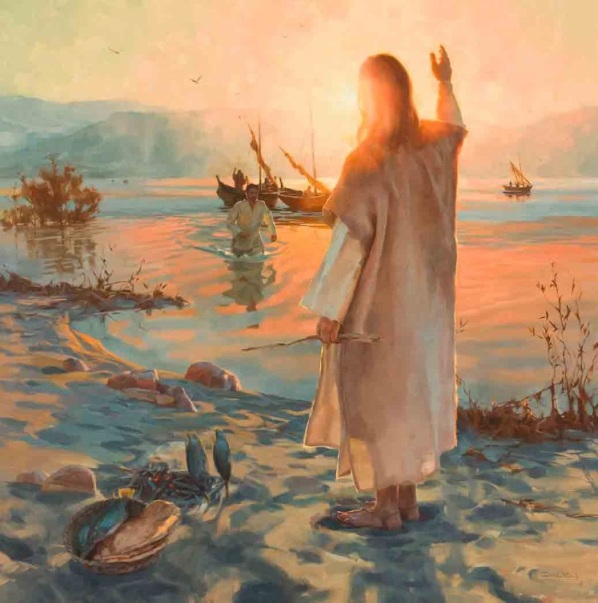 It is beyond doubt that the Church is the work of Christ Himself, and that, as He is the sole Author of the Christian religion, so He is also the immediate Founder of the Church.
He directly instituted that authority that binds together in one body all those who profess His religion. It is easily shown that it was Christ Himself, not His followers, not even His Apostles,
Who created that external bond of authority which was intended to unite all the Church's members.
It is beyond doubt that the Church is the work of Christ Himself, and that, as He is the sole Author of the Christian religion, so He is also the immediate Founder of the Church.
He directly instituted that authority that binds together in one body all those who profess His religion. It is easily shown that it was Christ Himself, not His followers, not even His Apostles,
Who created that external bond of authority which was intended to unite all the Church's members.
We speak here of authority in the abstract (i.e., in itself), not in the concrete (i.e., the subject in whom it resides). We cannot, however, abstract from the latter altogether; for Christ, when He created this power, at the same time specified the subjects in whom it was to reside.
I. Christ declared His intention of founding a Church, and that by the institution of a living authority, when He said to Simon Peter: Thou art Peter,
and upon this rock I will build My Church, and the gates of Hell shall not prevail against it.
Now, if Christ intends personally to build His Church, it is not to be the work of men.
Christ Himself will therefore give it all the necessary elements of a true social body, and, consequently, a ruling authority. And that there might be no room for doubt, He added:
And I will give thee the keys of the Kingdom of Heaven; and whatever thou shalt bind on earth shall be bound in Heaven, and whatever thou shalt loose on earth shall be loosed in Heaven
(Matt. 16: 18-20).
It matters little for our present purpose whether this power was promised to Peter alone or to the other Apostles as well, or even to the body of the faithful: it suffices that Christ promised to establish a ruling authority, and, consequently, a true society.
II. This authority was actually established, and therefore the Church founded, when Our Lord after His resurrection said to Peter: Feed My lambs… feed My sheep
(John 21: 15, 17). For, during His mortal life Christ Himself was the visible Head of the infant Church; henceforth, however, the office of visibly feeding the flock was to be discharged by another,
to whom Christ, together with the office, gave also the necessary authority to discharge it.
III. From the moment when, after the descent of the Holy Ghost, the Church first appeared before the world, we find a compact, fully organized society, with the Apostles at its head.
Now they who received his (St. Peter's) word were baptized, and there were added that day about three thousand. And they continued steadfastly in the teaching of the Apostles and in the communion of
the breaking of the Bread and in prayers
(Acts 2: 41-42). It was by the preaching of the Apostles, it is true, that the faithful were gained for the Church; but it was not the Apostles that
devised the plan of this social body, made Baptism the condition of membership, appointed the first supreme head, and invested him with authority. It was Christ Himself Who did all this,
and by so doing founded the Church.
IV. The Synagogue itself was the work, not of men, but of God; for God, through Moses as His representative, drew up its plan, gave it a suitable constitution, appointed its rulers, and defined the extent of their power. And it was from this divine origin that it derived its dignity and perfection. Now, the reality would be inferior to figure and shadow if while the Synagogue of the Old Law was the work of God, the Church of Christ were to be the work of men; and this would have been the case if Christ had not Himself created the life-giving principle of authority in His Church.
A church of the future
is, therefore, no less absurd than a Christian religion of the future; for the Founder of the Christian religion was at the same time the immediate Founder
of the Church. Hence the Fathers considered it one and the same thing to be outside the Church and to be an apostate from Christianity. He is no Christian,
says St. Cyprian,
who is not within the Church of Christ
(Ep. ad Antonian. 55, n. 24).
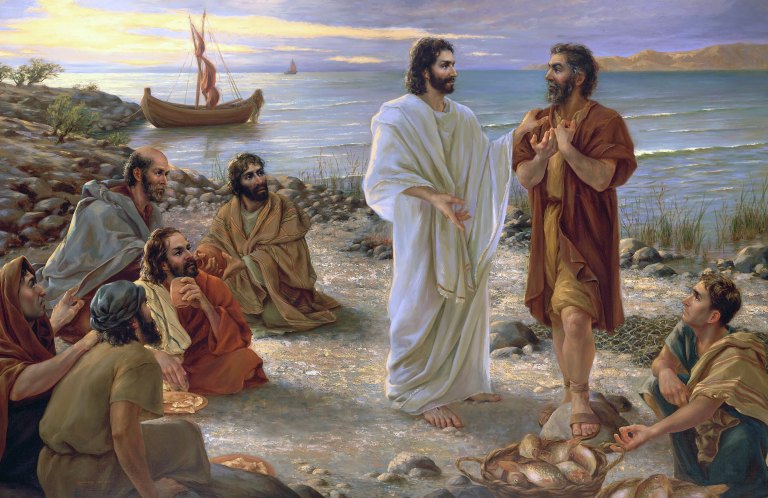
Alphabetical Index; Calendar List of Saints
Contact us: smr@salvemariaregina.info
Visit also: www.marienfried.com